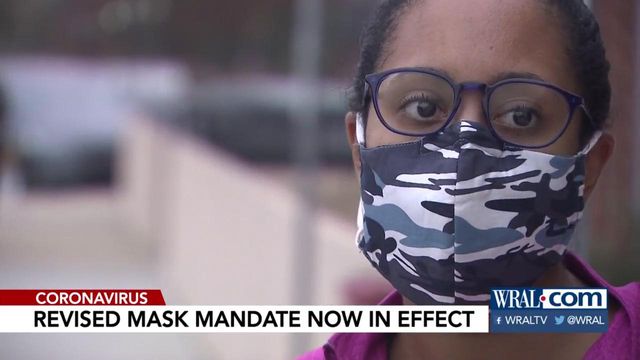NC curfew extended as more counties tip into COVID spread 'red zone'
Gov. Roy Cooper said Wednesday that the 10 p.m. statewide curfew would remain in place through Jan. 29 as coronavirus continues to rage in North Carolina.
Posted — UpdatedYour browser doesn't support HTML5 video.
Wake and Durham counties are among those orange zones. Orange, Chatham, Warren and Greene counties are the only areas in the state still considered "yellow zones," the lowest level in the alert system, with significant viral spread.
"No matter where you live, work, worship or play, COVID-19 remains a deadly threat, and we've got to treat it that way," Cooper said at an afternoon news conference.
The current page does not support this embedded media. To view this story with fully functioning media, please visit this page on our full site.
Even with the curfew in place, coronavirus infections and hospitalizations have reached record highs in recent weeks as people have traveled and gathered with others over the holidays.
Over the last week, North Carolina has averaged 7,074 new virus cases a day and a record 3,622 per day in hospitals with COVID-19. The percentage of positive virus tests hit a record 17.8 percent on Wednesday – the state's target is 5 percent or lower – and has averaged 15.9 percent over the last week.
Of the record 3,893 people hospitalized on Wednesday, 531 were admitted since Tuesday and 823 are in intensive care. Only 13 percent of ICU beds across the state are available – the lowest amount since the pandemic began 10 months ago.
"These are already astonishingly high numbers, and we don't think we've even seen the impact fully of the holidays yet," said Dr. Mandy Cohen, secretary of the state Department of health and Human Services. "We are in a very dangerous position.
Your browser doesn't support HTML5 video.
Cohen issued a directive Wednesday, calling on people to stay home aside from essential activities, such as going to work or school, seeking medical care or buying food. The directive also called on people not to gather with people outside of their households and to wear masks and keep away from others.
The curfew was to expire on Friday, but the governor said it needs to continue to help the state get ahead of the virus. Other measures, such as the statewide mask mandate and capacity limits for various businesses, also remain in place.
North Carolina's effort to get people vaccinated against coronavirus has gotten off to a slow start.
Only about a quarter of the doses shipped to the state so far have been used, and according to data from the Centers for Disease Control and Prevention, the state ranks 39th nationally in vaccinations per 100,000 residents.
NC vaccine hotline: 1-877-490-6642
"Getting the vaccine out quickly is the most important priority now, and we will use everything and everyone needed to get the job done," Cooper said.
DHHS has set up a system to allot vaccine doses in the coming weeks based on how many shots are being given, meaning those locations that are vaccinating more people will get larger shipments going forward.
Cohen said different counties are proceeding at different rates with the vaccination effort, and DHHS is providing any necessary support. She predicted things would accelerate in the next week or so.
Overcoming vaccine hesitancy also plays a part in expanding the effort, she said, adding that she recognizes that some people are reluctant to take a vaccine that was developed in months instead of the usual years-long process. But it's up to her and other health officials to ease those fears with facts and data.
"Now that we've had more than 100,000 people in North Carolina vaccinated with these two vaccines," she said, "we've had no serious safety concerns. I think folks will start to see that this vaccine – and they see their peers – that it's safe and effective."
Related Topics
• Credits
Copyright 2024 by Capitol Broadcasting Company. All rights reserved. This material may not be published, broadcast, rewritten or redistributed.
